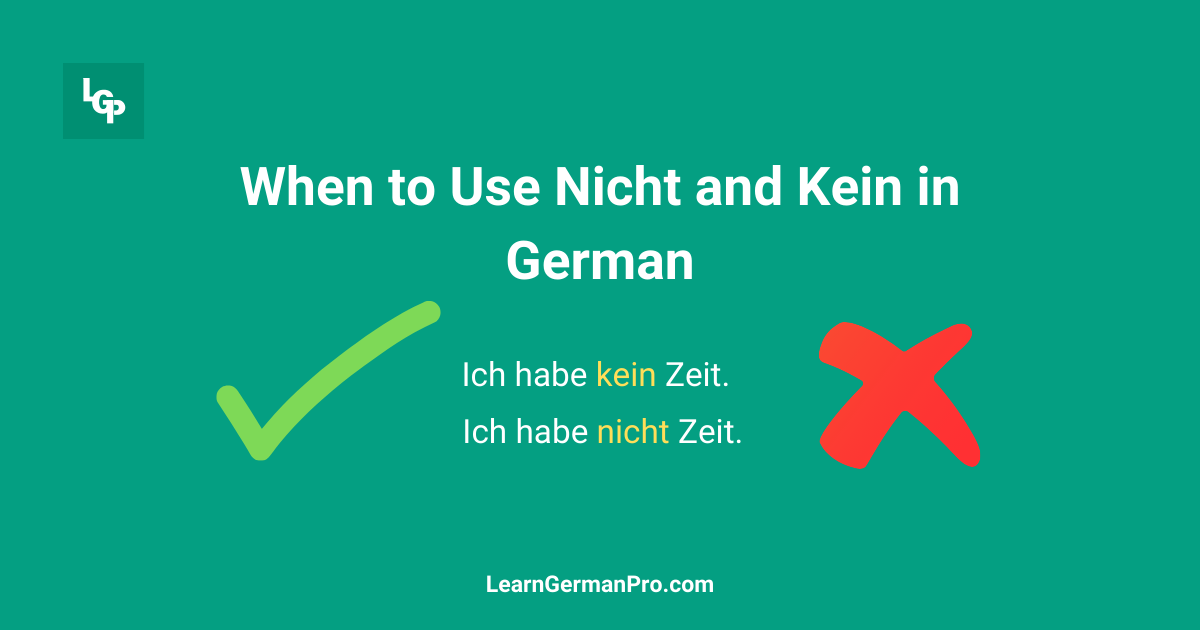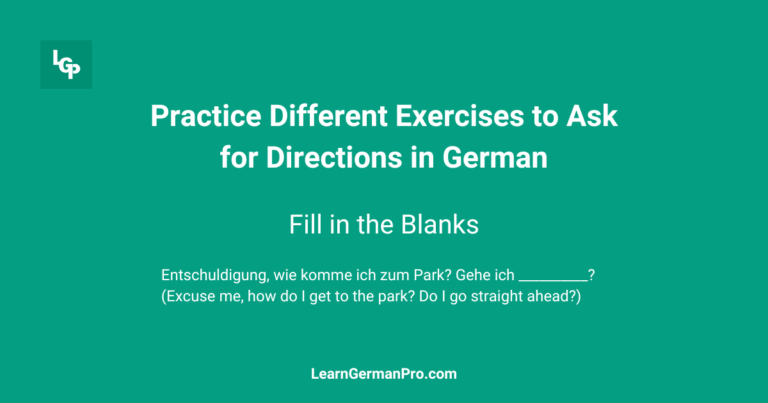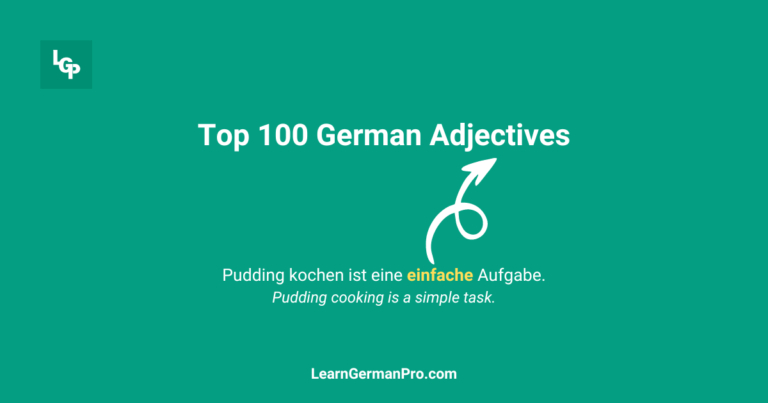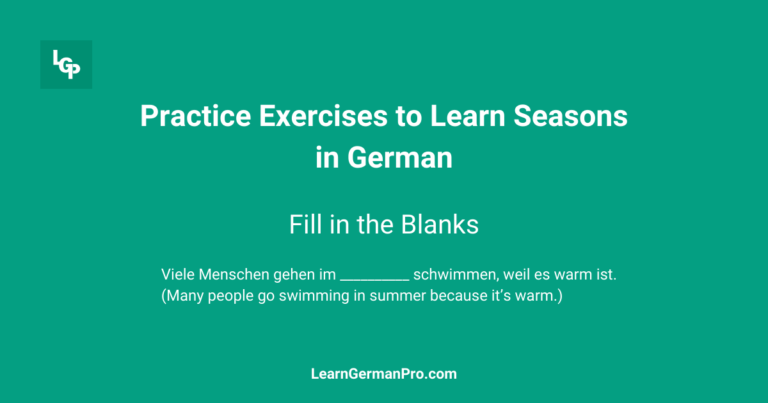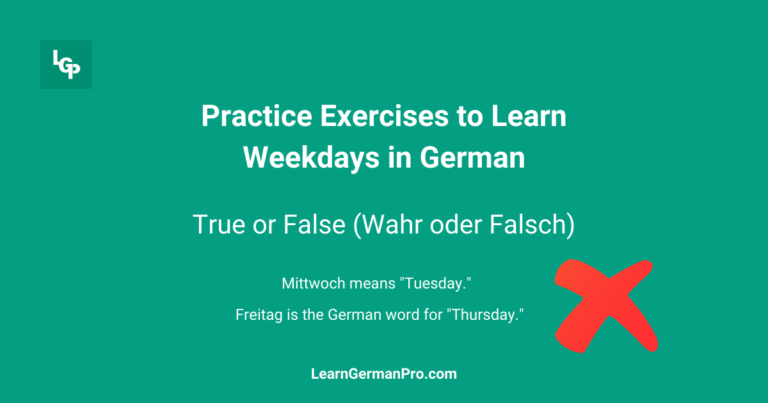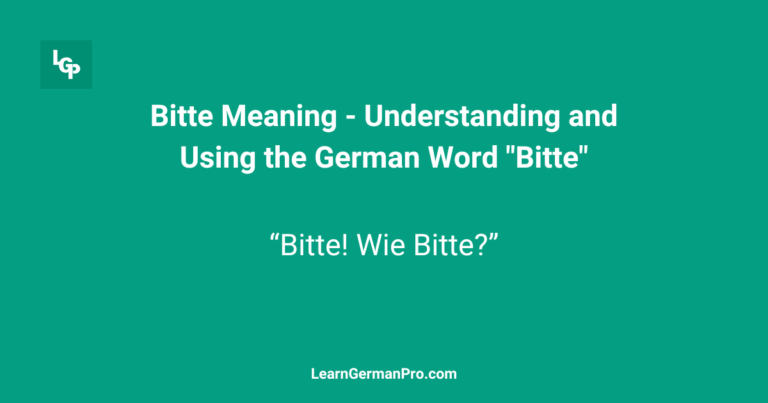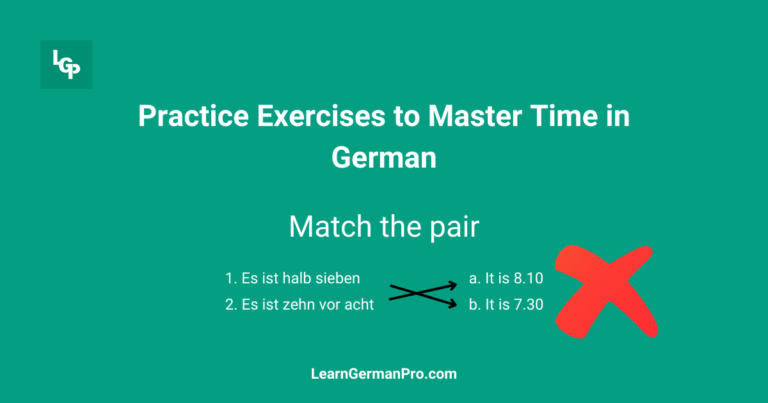When to Use Nicht and Kein in German
It is really very important to understand the difference between nicht and kein for beginners learning German. They are seriously confusing but both are used for negation, but in different contexts. Kein negates nouns that have indefinite articles, while nicht is used to negate verbs, adjectives, and sentences. This post provides more than 100 exercises to help you master when and how to use nicht vs kein, making your German sound more natural and accurate. So let’s get started.
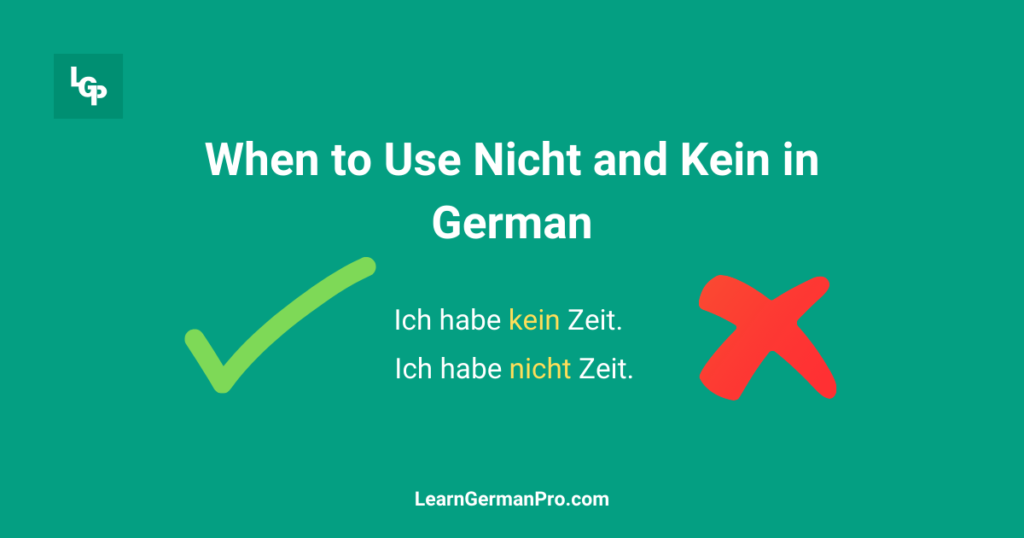
Nicht vs Kein Examples
With the help of the following exercises you can easily understand when to use nicht and kein in German, whether you are speaking or writing this will help you master the basics behind them.
Fill in the Blanks
- Ich habe ______ Zeit. (kein/nicht)
- Er ist ______ müde. (kein/nicht)
- Wir haben ______ Auto. (kein/nicht)
- Sie spielt ______ Fußball. (kein/nicht)
- Ich esse ______ Fleisch. (kein/nicht)
- Das ist ______ mein Freund. (kein/nicht)
- Wir kaufen ______ Gemüse. (kein/nicht)
- Sie hat ______ Hausaufgaben gemacht. (kein/nicht)
- Ich mag ______ Kaffee. (kein/nicht)
- Er hat ______ Bruder. (kein/nicht)
Multiple Choice
- Ich habe ______ Geld.
a) kein
b) nicht - Sie liest ______ Buch.
a) kein
b) nicht - Es ist ______ kalt draußen.
a) kein
b) nicht - Wir gehen ______ in die Stadt.
a) kein
b) nicht - Du hast ______ Hund.
a) kein
b) nicht - Wir trinken ______ Tee.
a) kein
b) nicht - Das ist ______ richtig.
a) kein
b) nicht - Sie spricht ______ Englisch.
a) kein
b) nicht - Sie haben ______ Auto.
a) kein
b) nicht - Ich kann ______ schwimmen.
a) kein
b) nicht
True or False
- “Kein” is used to negate verbs.
a) True
b) False - “Nicht” is used to negate adjectives.
a) True
b) False - “Kein” can be used with nouns that have a definite article.
a) True
b) False - “Nicht” comes before adjectives in sentences.
a) True
b) False - “Kein” is used for negating possessive phrases.
a) True
b) False - “Nicht” can negate an entire sentence.
a) True
b) False - “Kein” is always used for uncountable nouns.
a) True
b) False - “Nicht” can be used with nouns if the noun has an article.
a) True
b) False - “Kein” replaces “ein” in negative sentences.
a) True
b) False - “Nicht” is used before infinitive verbs.
a) True
b) False
Sentence Correction
- Ich habe nicht Apfel.
- Das ist nicht Auto.
- Sie haben kein glücklich.
- Er spielt nicht Tennis.
- Wir essen kein Brot.
- Du trinkst nicht Wasser.
- Das Wetter ist kein schön.
- Sie spricht kein.
- Ich habe nicht eine Katze.
- Sie geht nicht in Schule.
Match the Pairs
| 41. nicht | a) with nouns without definite articles |
| 42. kein | b) with verbs |
| 43. kein | c) with possessive pronouns |
| 44. nicht | d) with adjectives |
| 45. nicht | e) with entire sentences |
| 46. kein | f) replacing “ein” in negations |
Choose the Correct Negation
- Ich trinke ______ Tee.
- Das Buch ist ______ interessant.
- Er spielt ______ Basketball.
- Wir haben ______ Auto.
- Du sprichst ______ Deutsch.
- Sie liest ______ Buch.
- Der Film ist ______ lang.
- Wir gehen ______ heute ins Kino.
- Du hast ______ Hund.
- Er arbeitet ______ morgen.
Fill in the Correct Word (Kein/Nicht)
- Das ist ______ mein Buch.
- Wir essen ______ Kuchen.
- Sie ist ______ in der Stadt.
- Er hat ______ Auto.
- Sie hat ______ Freund.
- Ich verstehe ______.
- Das ist ______ meine Idee.
- Ich brauche ______ Hilfe.
- Du hast ______ Geld.
- Sie geht ______ zur Schule.
Translate to German
- I don’t have a car.
- He is not my friend.
- She doesn’t play tennis.
- We don’t have time.
- The book is not interesting.
- I don’t like apples.
- They don’t know the answer.
- You don’t speak English.
- This is not a good idea.
- We are not going to the park.
True or False (Advanced)
- “Kein” can be used with definite articles.
- “Nicht” always comes after the verb.
- You can use “nicht” before adjectives.
- “Kein” is only used with countable nouns.
- “Nicht” can negate verbs and entire sentences.
- “Kein” negates nouns without an article.
- “Nicht” is always placed after the subject.
- “Kein” is used for objects and nouns, while “nicht” is used for actions and adjectives.
- “Nicht” can be used before verbs in their infinitive form.
- “Kein” replaces “ein” in negations.
Negate the Following Sentences
- Er hat eine Katze.
- Sie ist sehr glücklich.
- Wir spielen Fußball.
- Das Haus ist groß.
- Ich habe einen Hund.
- Er hat einen Bruder.
- Wir gehen ins Kino.
- Du sprichst Spanisch.
- Sie ist Lehrerin.
- Ich lese ein Buch.
Complete the Sentence
- Das ist ______ mein Fahrrad.
- Ich habe ______ Geld.
- Wir gehen ______ heute.
- Sie ist ______ freundlich.
Answer Keys
- kein
- nicht
- kein
- nicht
- kein
- nicht
- kein
- nicht
- kein
- keinen
- a) kein
- a) kein
- b) nicht
- b) nicht
- a) kein
- a) kein
- b) nicht
- b) nicht
- a) kein
- b) nicht
- b) False
- a) True
- b) False
- a) True
- b) False
- a) True
- b) False
- a) True
- a) True
- a) True
- Ich habe keinen Apfel.
- Das ist kein Auto.
- Sie ist nicht glücklich.
- Er spielt kein Tennis.
- Wir essen kein Brot.
- Du trinkst kein Wasser.
- Das Wetter ist nicht schön.
- Sie spricht nicht.
- Ich habe keine Katze.
- Sie geht nicht zur Schule.
- b) with verbs
- a) with nouns without definite articles
- c) with possessive pronouns
- d) with adjectives
- e) with entire sentences
- f) replacing “ein” in negations
- keinen
- nicht
- kein
- kein
- nicht
- kein
- nicht
- nicht
- keinen
- nicht
- nicht
- keinen
- nicht
- kein
- keinen
- nicht
- nicht
- keine
- kein
- nicht
- Ich habe kein Auto.
- Er ist nicht mein Freund.
- Sie spielt kein Tennis.
- Wir haben keine Zeit.
- Das Buch ist nicht interessant.
- Ich mag keine Äpfel.
- Sie wissen nicht die Antwort.
- Du sprichst kein Englisch.
- Das ist keine gute Idee.
- Wir gehen nicht in den Park.
- False
- False
- True
- False
- True
- True
- False
- True
- True
- True
- Er hat keine Katze.
- Sie ist nicht sehr glücklich.
- Wir spielen keinen Fußball.
- Das Haus ist nicht groß.
- Ich habe keinen Hund.
- Er hat keinen Bruder.
- Wir gehen nicht ins Kino.
- Du sprichst kein Spanisch.
- Sie ist keine Lehrerin.
- Ich lese kein Buch.
- nicht
- kein
- nicht
- nicht

